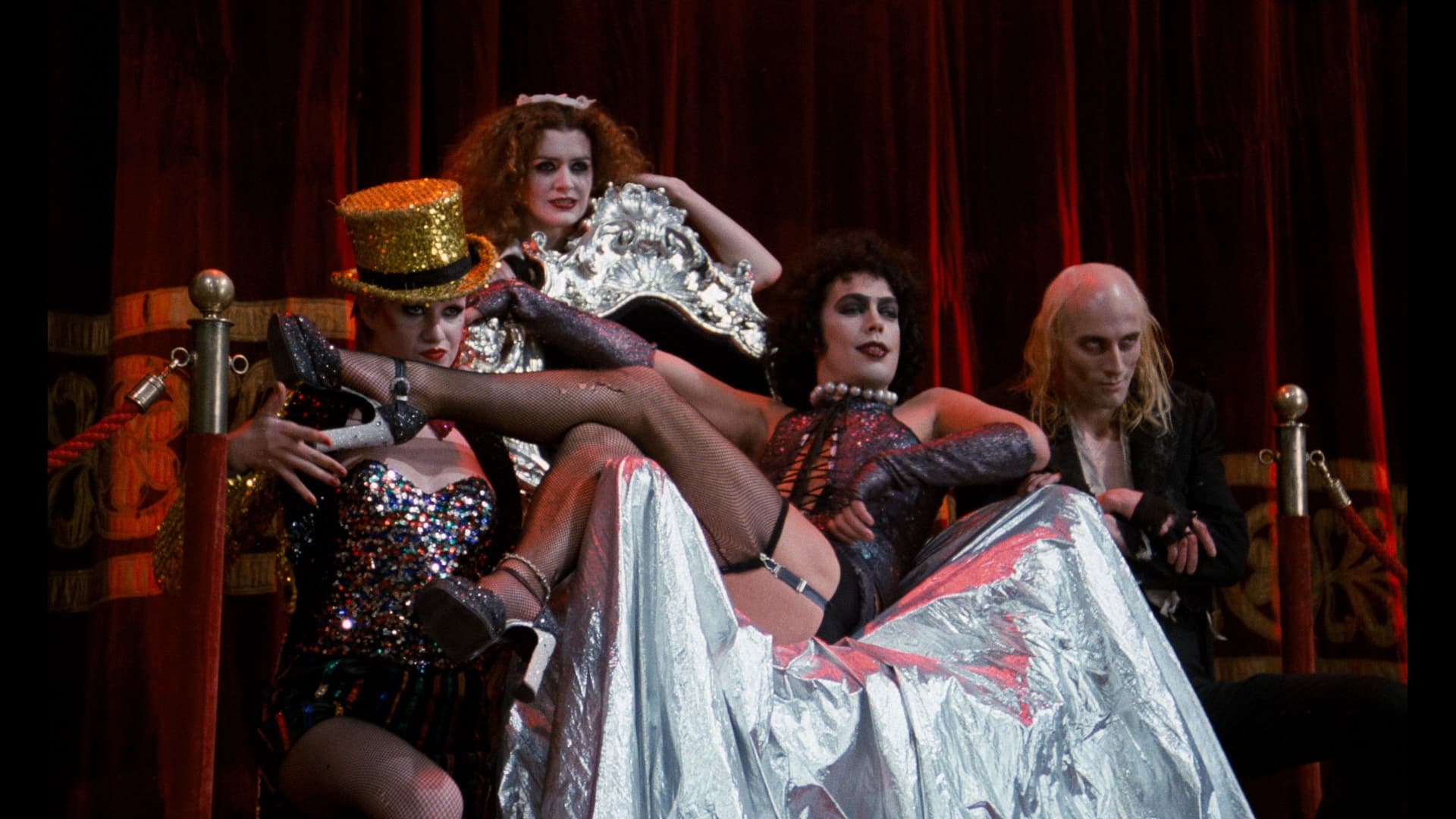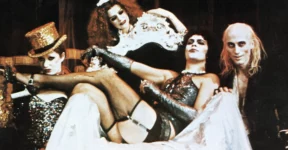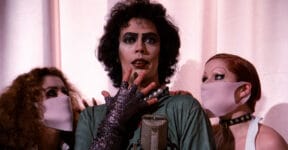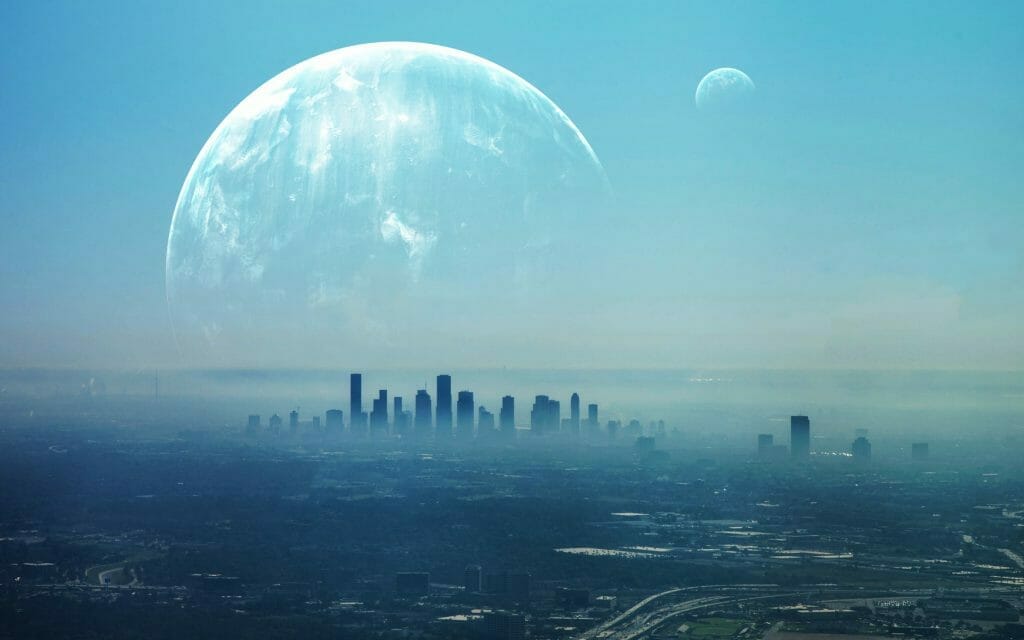For a film that puts transvestism as a cultural phenomenon under the spotlight back in the 1970s, The Rocky Horror Picture Show for sure uses more than enough familiar sci-fi elements to deliver its subversive and transgressive yet fragmented take on the subject. When a movie talks about transgenderism and LGBTQ acceptance in a largely heterosexual society, it usually frames the picture in a documentary (or documentary-style) narrative aimed at evoking better understanding of the issue in the audience. But you see little of that in this film. Instead, you’re presented with an assortment of science fiction tropes as a lens through which all the important messages are delivered to your senses.

The story focuses on Dr. Frank-n-Furter, a mad scientist of some sort. Our protagonists, Brad and Janet, find themselves inside Frank’s castle during the night when a breakthrough takes place: the scientist can finally give life to a humanoid of his own design. In case it doesn’t ring a bell, the whole undertaking is presented as a reference to Mary Shelley’s Frankenstein; in Rocky Horror, however, the monster isn’t an abomination with no name, but a dreamy male specimen named Rocky (portrayed by Peter Hinwood).
Here’s a bit of a trivia for you: Mary Shelley took inspiration from Giovanni Aldini, a real scientist who toured around Europe to demonstrate that running electrical current through a deceased body would make the muscle convulse, creating an otherworldly impression as if you could resurrect the dead. And just like how Victor Frankenstein creates his monster, Dr. Frank uses lighting to bring Rocky to life. Resurrecting the dead, or perhaps the origin of life itself, has always been one of the biggest mysteries that sparks scientific curiosities. Soon after the early film adaptation of Mary Shelley’s Frankenstein came out, an American biologist Robert E. Cornish became even more determined to experiment with the matter. Believe it or not, he did actually resurrect two dogs that had already been clinically put to death.
Once inside the castle, Brad and Janet realize that the people living in the castle are quite different in some ways. Dr. Frank himself is an alien – and a cross dresser one at that – originating from Transsexual Transylvania. While Janet doesn’t feel at ease with all their unusual flirty sense of hospitality, Brad plainly says to the effect that those people are probably “foreigners with a different culture.” And that’s probably all you need there to deliver a message about how the society at large thinks about queerness.
After Dr. Frank reveals Rocky, the sexually conservative Brad and Jane will undergo some crucial events that gradually erode their beliefs in the traditional values. Each of them also sleeps with Dr. Frank, reluctantly at first, but then they seem to accept such a drastic change with no fuss. Janet is also sexually attracted to Rocky – theoretically, Rocky isn’t even an actual human.
It’s all about the mental (and physical) journey of Brad and Janet from a conservative mindset to a much more liberal view on genders and sexuality. What makes The Rocky Horror Picture Show a real peculiarity is how the film frames everything by using a lot of sci-fi elements to bring it all together in one coherent piece:
- Dr. Frank is an extraterrestrial transvestite bisexual scientist
- Because Dr. Frank uses half of the brain of a delivery boy to create Rocky, there’s a transplantation procedure involved as well
- The combination of medical procedure and alien technology in the castle brings Rocky to life in a Frankenstein-style method
- Brad and Janet confront their own personal beliefs and welcome the extraterrestrial Dr. Frank as part of their sexuality
- Brad realizes that he’s a bisexual after having sex with an alien
- Janet feels released and at ease with her own sexuality after sleeping with an alien and a humanoid
Dr. Frank and Rocky are characters of pure sci-fi. The former is a scientist from another planet, whereas the latter is a humanoid creature; both are bisexual. Brad and Janet are a normal couple, recently engaged, ready to go through life together. When the two sides collide sexually, it shatters the couple’s traditional values and leads them to sexual freedom, which they actually prefer.
We think The Rocky Horror Picture Show is pretty smart in the way it uses many sci-fi tropes to get on point with the transvestism and LGBTQ messages. One of the main ideas of science fiction is to challenge our perspectives of the norms – the speculative nature of the genre encourages the audience to think about what’s possible and how society changes as people embrace those possibilities. You can almost say the same thing about the idea of permissive culture regarding sexual freedom. In a time when social norms become increasingly liberal, even the part of the society that puts traditional values to a high pedestal has to make way for the progressive wave. Just like how sci-fi continues to challenge what’s scientifically feasible, the queerness, as shown in the film will never refrain from pushing itself for acceptance in society.
Can you name any other film similar to The Rocky Horror Picture Show? Do you actually like musical films? We’d love to hear from you.
Other Things You Might Want to Know
Following his performance in The Rocky Horror Show (1975), Tim Curry appeared in many other films, including:
| Film | Year | Role |
| The Shout | 1978 | Robert Graves |
| Times Square | 1980 | Johnny LaGuardia |
| Annie | 1982 | Rooster Hannigan |
| The Ploughman’s Lunch | 1983 | Jeremy Hancock |
| Legend | 1985 | Darkness |
| Clue | Wadsworth | |
| Pass the Ammo | 1988 | Rev. Ray Porter |
| The Hunt for Red October | 1990 | Dr. Yevgeniy Petrov |
| Oscar | 1991 | Dr. Thornton Poole |
| Passed Away | 1992 | Boyd Pinter |
| Home Alone 2: Lost in New York | Mr. Hector | |
| Loaded Weapon 1 | 1993 | Mr. Jigsaw |
| The Three Musketeers | Cardinal Richelieu | |
| The Shadow | 1994 | Farley Claymore |
| Congo | 1995 | Herkermer Homolka |
| Muppet Treasure Island | 1996 | Long John Silver |
| McHale’s Navy | 1997 | Major Vladikov |
| Pirates of the Plain | 1999 | Jezebel Jack |
| Four Dogs Playing Poker | 2000 | Felix |
| Sorted | Damien Kemp | |
| Charlie’s Angels | Roger Corwin | |
| Scary Movie 2 | 2001 | Professor Oldman |
| The Scoundrel’s Wife | 2002 | Father Antoine |
| Kinsey | 2004 | Thurman Rice |
| Bailey’s Billion$ | 2005 | Caspar Pennington |
| Christmas in Wonderland | 2007 | Gordon McLoosh |
| The Secret of Moonacre | 2008 | Coeur de Noir, Sir William de Noir |
| Burke & Hare | 2010 | Prof. Alexander Monro |
Is Rocky Horror Picture Show part of a film series?
There have been attempts to produce direct sequels, but the projects are still indefinitely shelved at the moment. The closest thing to being a sequel is “Shock Treatment” released in 1891. While it’s largely a stand-alone feature, the story incorporates a little of continuity from The Rocky Horror Picture Show.
What about The Rocky Horror Picture Show: Let’s Do the Time Warp Again?
Released in 2016, it’s more like a tribute and remake of the original 1975 cult classic using the original script.
Check out other articles by month:







